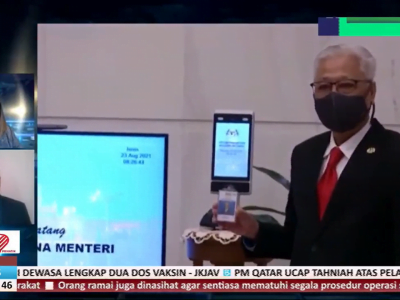Ever wondered what happened to some businesses in the country which seemed to have just vanished into thin air? We give you the lowdown in this article, and the possible reasons why they had to gulung tikar (close business).
Mega TV
This was the first-ever subscription TV service in Malaysia. Mega TV was operated by Cableview Services Sdn Bhd and began operations on 18 October 1995, with its first transmission on 1 November 1995. It began facing stiff competition from its main competitor, Astro satellite television network that launched seven months later. Mega TV had 5 channels while its competition, Astro, had 22 channels when it began. As a result of the competition and also its failures to expand its content offering, Mega TV ended transmission in 2001. Currently the two pay-TV service providers in Malaysia are Astro and HyppTV.
Rayani Air
This airline set itself apart as Malaysia’s first Shariah compliant airline. The airline made its first flight to Langkawi on 20 December 2015. However, what followed was a series of unfortunate and messy events. Many domestic flights were cancelled including their flights to Kota Kinabalu, Kuching, and Langkawi. Rayani Air was then revoked of its air service license following MAVCOM’s decision that it lacked financial and management capacity to continue operating as a commercial airline. The airline then apologized that it could no longer provide refunds for the cancelled flights as a result of investors pulling out after their Air Service License (ASL) and Air Service Permit (ASP) was withdrawn.
Aside from that, Rayani Air was also said to have been unable to pay its pilots, which caused the pilots to go on a strike. Despite all this, the airline is said to be in talks to secure funding to help its financial problems, and was said to be applying for new flight licenses in September 2016. As of now, no new updates yet from the troubled airline of resuming its operations.
The main problems which brought the airline to its demise is the incompetence along with its operational issues. Perhaps upon rectifying its operational issues, the airline, which is said to be eyeing a comeback, will be able to take off again

Delifrance
This was once the go-to place for Malaysians to get their pastry and sandwich fix. However, Delifrance outlets have ceased to exist, and the website is no longer up and running. Opened in 1990, Delifrance celebrated its 30th anniversary in 2013. An attempt by Delifrance International’s managing director, Jean-Manuel Leveque was the third rebranding exercise and was done in response to changing market conditions.
It was previously known as Delifrance Bistro, but was then changed to Delifrance after the re-branding as they wanted to be known as a café with casual dining concept. After the failed rebranding, outlets in popular malls such as Mid Valley, 1 Utama and other locations no longer exist. As of 2013, there were apparently 450 outlets worldwide, with 230 outlets said to be located in Asia. The last post on Delifrance Malaysia’s official Facebook was in 2015, which is about the time we think it ceased operation in Malaysia. Delifrance may have failed to catch a slice of the pie with the opening of many cafés and hipster coffee shops, offering Malaysians more options.
Paris Hilton Handbags & Accessories
This boutique is among the many businesses behind the socialite and Hilton Hotels heiress, Paris Hilton. Despite once being among the high profile celebrities in the world, her handbags and accessories line failed to garner interest with Malaysians. The last published post on their official Facebook account was in 2014. Notable outlets of the boutique which were located in shopping malls such as the upmarket Pavilion and 1 Utama Shopping Center have since closed down. Business operators who brought the brand into the country may have been banking on the socialite’s status to drive sales. Following Paris’ drop from the limelight, so did her accessories business in Malaysia.
Gorgeous Fitness Gym
Citing itself as the first lifestyle concept fitness center, this gym landed itself into trouble following throngs of angry customers to its outlet at 1shamelin Mall. This was caused by the sudden closure with only a handwritten notice to inform the customers, and no prior notice before hand. Apparently, the outlet accumulated rent of over RM700,000, so power to the outlet was cut off by the mall’s management. A Facebook page called “request refund from Gorgeous Fitness” was set up by disgruntled customers. The gym’s website and Facebook are still up however are no longer active. Gorgeous Gym could have landed itself into trouble as a result of its incompetence, which could have caused the backlog in rental payment and resulted in the sudden closure of its outlet.

Vape Shops
The debate on whether to ban or regulate vaping in Malaysia caused many of the vape shops in the country to go up in smokes. Regular raids by Ministry of Health on vape shops was also part of the reason behind many having to call it quits.
“In 2015, we estimated that the number of vaping shops in Kuala Lumpur was about 600. But now, it’s not more than 150. Every day we hear of shops being closed” – Norman Ismail, secretary general of the Malaysia E-Vaporizers and Tobacco Alternative Association (MEVTA) (source: sea-globe)
The main worry with vaping is the danger in home-made vape liquids, also known as vape juice, as the nicotine content is not standardized, and there is no sure way of knowing what is in the liquids. However, despite raids by health officials and debate on the bans, the vaping industry was said to be supportive of regulations in Malaysia. As of now, vape shops are still around although not as many as when Malaysians were first introduced to vaping about 2 years ago.
Many Vape shop owners in Malaysia began facing problems when their shops were raided by health officials. As a result, their vape mods and liquids were confiscated which resulted in losses. In Johor, the Sultan of Johor ordered all Vape shops to cease operations by January 2016 with 1 month notice given. Following the National Fatwa Council declaring vaping as Haram may have further caused sales from Muslim vapers to drop. Aside from that, setting up a business based on a trend could also be the reason behind vape shops that had to close down. The novelty behind vaping was said to have died down, with shop owners citing they have not been receiving any first time buyers for months and facing days with zero sales.
Western Digital
You may have a portable disk storage of this brand, or remember seeing this brand at many IT shops. However, in 2016, this computer data storage firm closed down its factory plant in Penang which was said to have caused 1,200 people losing their jobs. Following the factory’s closure, it was reported that Western Digital have put the land, which the factory was located on, for sale in February 2017. This major company closed down its plant in Penang as part of its plan to wind up operations in Malaysia and moved it to neighboring country, Thailand.
Services
Stakeholder mapping, analysis, engagement and communication needs to be detailed to avoid business losses or even worse, a crisis. How can you do this effectively to prevent failure? ...
Data-driven business decisions have never been as crucial, especially in this era. MGBF leverages off, technology, experience and market presence to aid businesses in making accurate decisions. ...
MGBF provides comprehensive strategic advice and results-focused solutions to solve clients' problems in business-government relations so they can focus on their core business. ...
A critical business challenge is meeting the right decision-makers and potential buyers through the best channel and platform. How will you improve your business competency? ...
Upcoming Events
MGBF founding chairman Nordin Abdullah and UMW Toyota president Datuk Ravindran K. will delve into the convergence of automotive innovation and environmental sustainability in Penang, Sarawak, Johor and Pahang.
Hosted by menumiz™ – an end-to-end restaurant management system – this roundtable will feature a case study presentation and a panel session to discuss the latest digital trends, challenges, and opportunities within the food and beverage sector.
In this episode of 'A Working Lunch with Nordin', MGBF's founding chairman, Nordin Abdullah, will host this discussion focusing on the biggest threats and opportunities for businesses as we look to manage change in the South China Sea.
This MGBF Roundtable will focus on regional food security issues and trends in the regional supply chain, and trade regulations and policies, including a new geopolitical tool i.e., weaponisation of supply chains.
MGBF In The News

Planet QEOS, KIS BlOCNG San Bhd, and the Sarawak Land Consolidation and Rehabilitation Authority (SALCRA) have officially signed a tripartite memorandum of understanding (MoU) to establish a collaborative framework aimed at producing bio-hydrogen via the Steam Biomethane Reforming (SBMR) Process. The MoU was signed by Planet QEOS executive chairman Dino […]

Planet QEOS and China Machinery Engineering Corporation (CMEC) are interested in investing RM10 billion to co-develop advanced Megawatt peak (MWp) agrovoltaic in Baram, to further boost Sarawak’s green energy initiative and food security. Sarawak Premier Datuk Patinggi Tan Sri Abang Johari Tun Openg was briefed on Friday by both the […]

Last week SPM results came out, 373,974 aspirants who have been waiting patiently over the last few months would now know their fate. Some 10,109 have received all A’s, the golden standard of academic success and the ticket to those looking to study the “more advanced” subjects in university. Proudly, […]

The classic knee-jerk reaction is to say, fire the coach, change the leadership of associations, and reduce the funding till they start performing better. This kind of negative reinforcement may work for kindergarten children, but we are dealing with high-performance adults – individuals much further along in their psychological and […]

Since its earliest tea plantations in 1929, Cameron Highlands has grown to become a key player in the agricultural landscape of Malaysia, producing 40 per cent of all vegetables grown. Despite Malaysia shifting its economic focus away from agriculture, the industry remains imperative for food security and the livelihoods of […]

Although at first glance the travel industry and the agricultural sector appear to have nothing in common, they actually share more than meets the eye. The economic benefits of tourism to the agricultural sector can be multiplied several times over. “Tourism brings the end consumers closer to the source, which […]

The Malaysia Global Business Forum (MGBF) recently held a high-level roundtable themed ‘Designing the Future of the Digital Economy’, attended by industry leaders and business associations. The guest of honour was Yang Berhormat Syerleena Abdul Rashid, the Member of Parliament (MP) for Bukit Bendera in Penang. The MP’s Special Session […]

The Malaysia Global Business Forum (MGBF) will be hosting a roundtable on ‘Designing the Future of the Digital Economy’ on 23 February 2023. It is the culmination of the first three MGBF Exclusive Roundtable Series titled ‘The Evolving Threat Matrix in the Digital Economy’ held throughout 2022. According to the […]

The Founding Chairman of the Malaysia Global Business Forum (MGBF), Nordin Abdullah, today spoke on Bernama TV’s leading English talk show, The Brief, hosted by Jessy Chahal, on the topic of a stable political reality and what that means for the Malaysian economy. Nordin said, “The first thing that it […]

More than 1,100 years ago, Muhammad ibn Musa al-Khwarizmi was developing the mathematical formulas that we know today as algorithms which now have become so intertwined with the business fortunes of global media giants and the very fabric of geopolitics. A series of recent high level international reports have revealed […]

KSK Land has been recognised by the Malaysia Global Business Forum (MGBF) for its role in attracting high net-worth individuals to Malaysia post-pandemic. The first challenge in investor attraction is “selling” the country. In the context of Asia, Malaysia is competing with some very established investment destinations. The second […]

Malaysia, in particular Kuala Lumpur, continues to position itself as a regional centre to do business, educate a family and enjoy a global lifestyle. One company, KSK Land, has taken the lead in positioning itself and the city of Kuala Lumpur as a property investment destination for the global citizen […]

The upcoming budget represents an opportunity to build resilience in the critical sectors that will form the backbone of the country’s future-facing economic ambitions. This however needs to be achieved in the context of managing the community sectors most impacted by COVID-19 over the past two years. The Keluarga Malaysia (Malaysian Family) […]

Malaysia Global Business Forum (MGBF) has moved to support the creative economy as the overall economy moves into a recovery phase following the COVID19 pandemic. As a step in the direction of normalcy, the MGBF has agreed to host the art exhibition “I Know You’re Somewhere So Far” by one […]

Congratulations to Datuk Seri Ismail Sabri Yaakob for taking up the mantle of the ninth prime minister of Malaysia. There is nothing normal about the situation; it could not have been scripted but it has kept the spectrum of media, mainstream and social, gripped. The first order of business for […]

In a stirring speech to the nation, President Joseph R. Biden, Jr. stamped his brand of leadership on the presidency, in his first act as the 46th president of the United State of America, it signaled several shifts. Perhaps the weather was foreboding with snow falling before the ceremony that […]

KUALA LUMPUR, 6 July 2022 – As the global economy continues to deal with unprecedented levels of disruption caused by the pandemic and the conflict between Russia and Ukraine, the convergence of energy security and food security issues has become a front-of-mind issue faced by policy makers and consumers alike. […]

KUALA LUMPUR, 23 June 2022 — Malaysia Global Business Forum (MGBF) ties up with scoutAsia to ensure that businesses are equipped with deeper regional insights. The past two years has seen a massive shift in the way businesses are conducted with digitisation, digitalisation and automation continuously being adopted to improve […]

KUALA LUMPUR, 25 May 2022 – The Malaysia Global Business Forum (MGBF)’s exclusive roundtable on ‘Security Concerns in Critical Value Chains’ was held in a hybrid setting yesterday at the Eastin Hotel Kuala Lumpur. The guest of honour was Yang Berbahagia Tan Sri Dato’ Seri Rafidah Aziz, former minister of […]




































